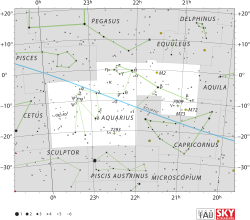Psi2 Aquarii
| Psi2 Aquarii (ψ2) | |
 | |
| Observationsdata Epok: J2000.0 | |
|---|---|
| Stjärnbild | Vattumannen |
| Rektascension | 23t 17m 54,21372s[1] |
| Deklination | -09° 10′ 57,0675″[1] |
| Skenbar magnitud () | +4,403[2] |
| Stjärntyp | |
| Spektraltyp | B5 Vn[3] |
| U–B | -0,561[2] |
| B–V | -0,146[2] |
| Variabeltyp | λ Eri[4] |
| Astrometri | |
| Radialhastighet () | -6[5] km/s |
| Egenrörelse (µ) | RA: +17,13[1] mas/år Dek.: -11,70[1] mas/år |
| Parallax () | 8,12 ± 0,38[1] |
| Avstånd | 400 ± 20 lå (123 ± 6 pc) |
| Absolut magnitud () | -1,04[6] |
| Detaljer | |
| Radie | 4,6 ± [7] R☉ |
| Luminositet | 565 ± 3,1[6] L☉ |
| Temperatur | 15 212 ± 288[7] K |
| Vinkelhastighet | 341[8] km/s |
| Andra beteckningar | |
| ψ2 Aqr, 93 Aquarii, BD-09 6160, HD 219688, HIP 115033, HR 8858, SAO 146620. [9] | |
Psi2 Aquarii (ψ2 Aquarii, förkortat Psi2 Aqr, ψ2 Aqr) som är stjärnans Bayerbeteckning, är en ensam stjärna belägen i den östra delen av stjärnbilden Vattumannen. Den har en genomsnittlig skenbar magnitud på 4,40[2] och är synlig för blotta ögat där ljusföroreningar ej förekommer. Baserat på parallaxmätning inom Hipparcosuppdraget på ca 8,1[1] mas, beräknas den befinna sig på ett avstånd på ca 400 ljusår (ca 123 parsek) från solen.
Egenskaper
[redigera | redigera wikitext]Psi2 Aquarii är en blå till vit stjärna i huvudserien av spektralklass B5 Vn[3], där ”n”-suffixet anger att absorptionslinjerna i dess spektrum breddas genom doppler-skiftning på grund av stjärnans snabba rotation. Den projicerade rotationshastigheten hos stjärnan är 341 km/s.[8] Den har en radie som är ca 4,6[7] gånger större än solens och utsänder från dess fotosfär ca 565[6] gånger mera energi än solen vid en effektiv temperatur av ca 15 200[7] K.
Psi2 Aquarii är en Lambda Eridani-variabel eller periodisk Be-stjärna, med en pulsationscykel på 1 073 dygn.[4] Variationens amplitud av den skenbara magnituden är 0,024 enheter.[10]
Referenser
[redigera | redigera wikitext]- Den här artikeln är helt eller delvis baserad på material från engelskspråkiga Wikipedia, tidigare version.
Noter
[redigera | redigera wikitext]- ^ [a b c d e f] van Leeuwen, F. (2007), "Validation of the new Hipparcos reduction", Astronomy and Astrophysics, 474 (2): 653–664, arXiv:0708.1752, Bibcode:2007A&A...474..653V, doi:10.1051/0004-6361:20078357.
- ^ [a b c d] Kozok, J. R. (September 1985), "Photometric observations of emission B-stars in the southern Milky Way", Astronomy and Astrophysics Supplement Series, 61: 387–405, Bibcode:1985A&AS...61..387K.
- ^ [a b] Lesh, Janet Rountree (December 1968), "The Kinematics of the Gould Belt: an Expanding Group?", Astrophysical Journal Supplement, 17: 371, Bibcode:1968ApJS...17..371L, doi:10.1086/190179.
- ^ [a b] Balona, L. A. (December 1995), "Tests of the Pulsation and Starspot Models for the Periodic Be-Stars", Monthly Notices of the Royal Astronomical Society, 277 (4): 1547, Bibcode:1995MNRAS.277.1547B, doi:10.1093/mnras/277.4.1547.
- ^ Wilson, Ralph Elmer (1953), General Catalogue of Stellar Radial Velocities, Washington: Carnegie Institution of Washington, Bibcode:1953GCRV..C......0W.
- ^ [a b c] Lesh, Janet Rountree (December 1968), "The Kinematics of the Gould Belt: an Expanding Group?", Astrophysical Journal Supplement, 17: 371, Bibcode:1968ApJS...17..371L, doi:10.1086/190179.
- ^ [a b c d] Underhill, A. B.; et al. (November 1979), "Effective temperatures, angular diameters, distances and linear radii for 160 O and B stars", Monthly Notices of the Royal Astronomical Society, 189: 601–605, Bibcode:1979MNRAS.189..601U, doi:10.1093/mnras/189.3.601.
- ^ [a b] Bernacca, P. L.; Perinotto, M. (1970), "A catalogue of stellar rotational velocities", Contributi Osservatorio Astronomico di Padova in Asiago, 239 (1), Bibcode:1970CoAsi.239....1B.
- ^ "* 93 Aqr". SIMBAD. Centre de données astronomiques de Strasbourg. Hämtad 2012-07-06.
- ^ Balona, L. A. (July 1990), "Short-period variability in Be stars", Monthly Notices of the Royal Astronomical Society, 245: 92–100, Bibcode:1990MNRAS.245...92B.





